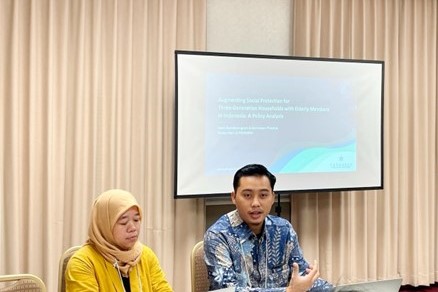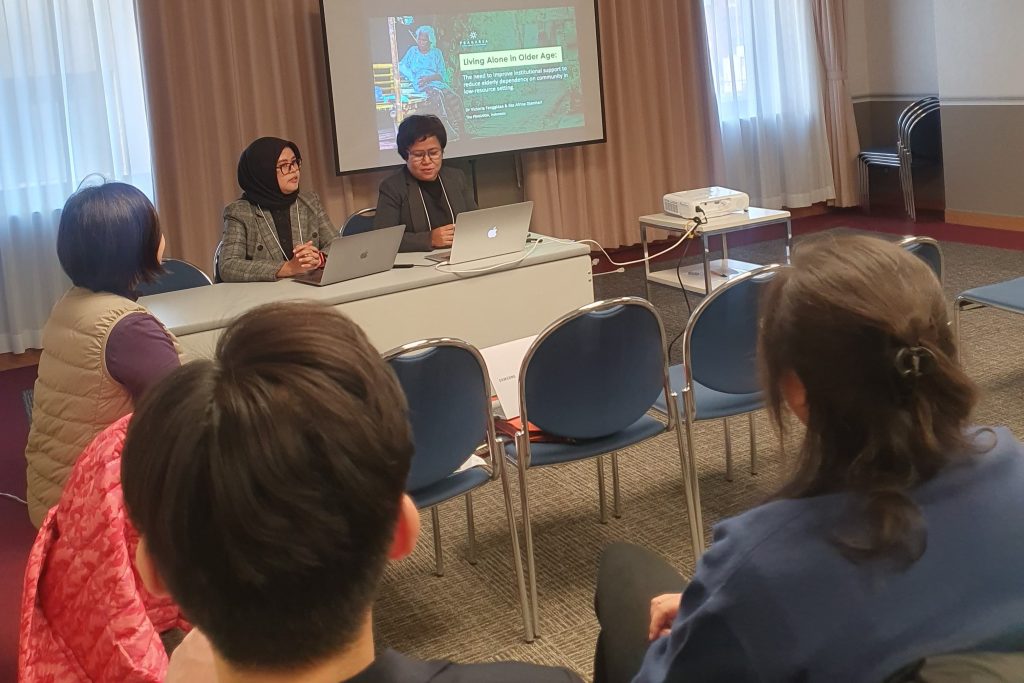IWednesday 1 April 2020 through the intermediary of one of the online applications, PRAKARSA holding a webinar with the theme "Health Services and Handling Covid-19 in the Regions". This webinar was held with the aim that all parties, including government, local government and non-government actors, can share the best ideas to suppress the spread of the Covid-19 pandemic and minimize the impact caused by the spread of this virus.
This webinar was held one day after information regarding the issuance of 4 regulations from the central government that responded to the increase in cases of the spread of COVID-19. Dr. Hermawan Saputra, who is a member of the task force for handling COVID-19 in Indonesia, stated that this is the first time the central government has issued 4 regulations at once in one day. The regulations are as follows: Presidential Decree No. 11 of 2020 concerning the Determination of the Covid-19 Public Health Emergency, Government Regulation in Lieu of Law Number 1 of 2020 concerning State Financial Policy and Financial System Stability for Handling the Covid-19 Pandemic, Decree of the Minister of Finance Number 6 of 2020 concerning Distribution of Physical DAK in the Health Sector and the Health BOK Fund in the Context of Prevention and/or Handling of Covid-19 and Government Regulation No. 21 of 2020 concerning Large-Scale Social Restrictions to Accelerate Handling of Covid-19.
Responding to several regulations/policies that have been issued by the central government, PRAKARSA sees that there are still gaps that need attention in handling the spread of Covid-19, especially at the regional level. Coupled with the condition of Indonesia which numbers Universal Health Coverage (UHC) is still not optimal. Based on UHC research: Tracking Indonesia's Progress which is conducted by PRAKARSA in 2019, the UHC service coverage index was 60 nationally. There was an increase in the index value of the UHC tracking conducted by WHO in 2017 from 49 to 60. However, this condition does not reflect that inequality between urban and rural areas does not occur. This is related to the development of the Covid-19 case in Indonesia, which has touched a death rate of 8,9 percent in 32 provinces. There are several challenges in handling Covid-19 in regions which are also affected by the low UHC service coverage index, including:
- High TB cases and low case detection rate potentially increase case fatality rate. In 2018 there were 1.017.290 TB prevalence cases. Moreover, case detection rate in Indonesia is still low at 51 percent. So that people with TB have a greater potential for contracting the Covid-19 virus.
- The high number of deaths, especially in DKI Jakarta, indicates that the capacity of health services is still limited.
- Inequality of infrastructure and distribution of health workers in the regions.
- Areas outside Java do not have adequate equipment in handling COVID-19 (masks, ventilators and PPE).
In addition to the challenges that have been presented by researchers PRAKARSA, there are several other challenges that were also expressed by Dr. Hermawan Saputra namely; the rate of increase in the spread of Covid-19 is closely related to the rate of population growth in Indonesia so that the spread is very high. The disparity in health service coverage that occurs between eastern Indonesia and western Indonesia also needs to be looked at. In fact, the number of positive cases of Covid-19 is higher in the western part of Indonesia compared to eastern Indonesia. The biggest problem that Indonesia is currently facing is the regional government which has higher concerns than the central government. This is due to the very limited availability of health workers and health facilities in the regions. For example, DKI Jakarta alone, which has the most adequate staff and health facilities in Indonesia with the highest health service coverage index, has begun to be overwhelmed in handling this Covid-19 case.
In addition, the challenges faced by the central government and the task force for handling COVID-19 are not yet available maps made by the task force regarding referral hospitals. The reason for not making it maps This is because the government is worried that there will be an accumulation of patients in health care facilities. This is mainly due to the condition of regional hospitals whose quality is still in class C. Currently 80 provinces in Indonesia have been infected, the Presidential Regulation must immediately be followed up by the regional government. The state apparatus must carry out social restrictions so that further transmission does not occur in the field. In dealing with conditions like this, you can no longer rely on pulmonary specialists or internal medicine, because the number in the area is very limited. Must be done soon task settings for general practitioners from pulmonary and internal medicine specialists, in a short and quick period of time so that health workers who can treat patients who are positive for COVID-19 can be fulfilled.
Prof. Hasbullah Thabrany also conveyed about strengthening the participation of all elements of society and local governments to control the spread of COVID-19. The central government also needs to consider financial needs to support the strengthening of the role of the community and local government. In this webinar Prof. Hasbullah also said that in every policy decided by the government there must be pros and cons. Including policies related to efforts to deal with the COVID-19 pandemic. Theoretically, regional policies contain provisions for handling a pandemic such as COVID-19. If there is an expert who is able to handle COVID-19 in an area and the area has adequate capabilities, the local government is welcome to localize the policy for handling this pandemic. However, when this condition does not occur, the handling of a pandemic like this must be addressed together with the central government.
Based on several policies that have been issued by the central government, several potential solutions have been found that can be carried out by elements of the community and local governments, including; limit movement and maintain a minimum distance of 2 meters. In this case, the role of local government is expected to be able to discipline and regulate its citizens. Doing rapid-test at least twice because the incubation period of the virus is 14 days, here is the challenge of the regional government's ability to be tested. "I don't think I can afford it, therefore there needs to be a role from the central government, because the budget needs are also important to pay attention to because the cost of rapid tests is quite expensive," said Prof. Hasbullah. The next solution is to stop population mobility (local governments can do this to increase preparedness regarding the spread of this virus). The next potential solution is to coordinate between regions to deal with this pandemic independently.
It should be under these conditions that everyone should be suspected of being infected with COVID-19, so that everyone can be tested to make sure they are positive or negative. The rapid-test was carried out as an effort to mitigate the preparedness of the spread of COVID-19. Statement from Dr. Hermawan Saputra is also in line with the efforts of the central government in the context of implementing Large-Scale Social Restrictions, with the issuance of these policies, it is hoped that local governments can reduce these policies into governor regulations, regent regulations, or mayor regulations, etc.
It is interesting to see how this pandemic is affecting the lives of people who cannot work from home and have to fulfill their daily needs. Actually, the central government has made policies by considering various economic aspects and reducing the responsibilities of the community itself. However, many of our people still act as risk takers and are not disciplined in obeying government regulations. The fact is that assistance from the central government does take time to reach the recipients, especially informal workers. This is where the role of local governments becomes important to prioritize the public interest by starting to provide assistance to their communities first. Don't think that this is only the responsibility of the central government.
Author: Aqila Layyinah



